小学五年级一般现在时精讲和精练教案说课材料
- 格式:pdf
- 大小:55.66 KB
- 文档页数:8
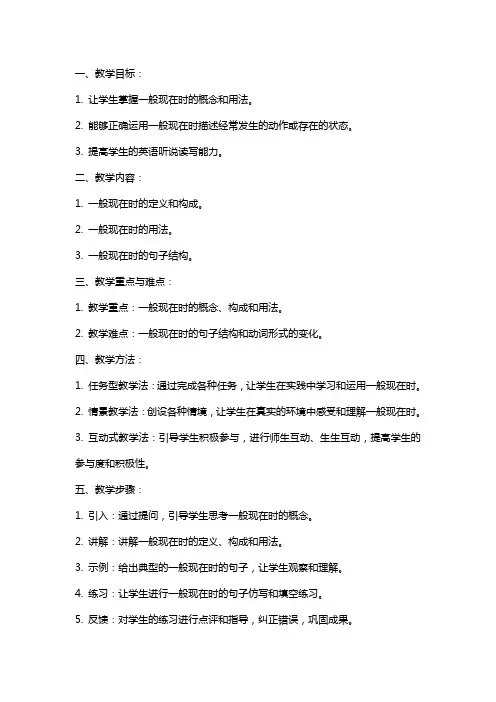
一、教学目标:1. 让学生掌握一般现在时的概念和用法。
2. 能够正确运用一般现在时描述经常发生的动作或存在的状态。
3. 提高学生的英语听说读写能力。
二、教学内容:1. 一般现在时的定义和构成。
2. 一般现在时的用法。
3. 一般现在时的句子结构。
三、教学重点与难点:1. 教学重点:一般现在时的概念、构成和用法。
2. 教学难点:一般现在时的句子结构和动词形式的变化。
四、教学方法:1. 任务型教学法:通过完成各种任务,让学生在实践中学习和运用一般现在时。
2. 情景教学法:创设各种情境,让学生在真实的环境中感受和理解一般现在时。
3. 互动式教学法:引导学生积极参与,进行师生互动、生生互动,提高学生的参与度和积极性。
五、教学步骤:1. 引入:通过提问,引导学生思考一般现在时的概念。
2. 讲解:讲解一般现在时的定义、构成和用法。
3. 示例:给出典型的一般现在时的句子,让学生观察和理解。
4. 练习:让学生进行一般现在时的句子仿写和填空练习。
5. 反馈:对学生的练习进行点评和指导,纠正错误,巩固成果。
6. 扩展:通过听力、口语、阅读和写作等多种形式,让学生进一步巩固一般现在时的运用。
7. 总结:对本节课的内容进行总结,强调一般现在时的关键点。
8. 作业布置:布置有关一般现在时的练习题,让学生课后巩固。
9. 课后反思:对课堂教学进行反思,总结优点和不足,为下一步教学做好准备。
10. 教学评价:通过课后作业、课堂表现和考试成绩等多种途径,对学生的学习情况进行评价。
六、教学资源:1. 教材:英语课本及相关辅导资料。
2. 课件:一般现在时的PPT课件。
3. 练习题:一般现在时的练习题及答案。
4. 教学工具:黑板、投影仪、录音机等。
七、教学评价:1. 课后作业:检查学生对一般现在时的理解和运用。
2. 课堂表现:观察学生在课堂上的参与程度、听说读写能力的发挥。
3. 考试成绩:评估学生在测试中的一般现在时掌握情况。
八、教学进度安排:1. 第1周:讲解一般现在时的概念和用法。
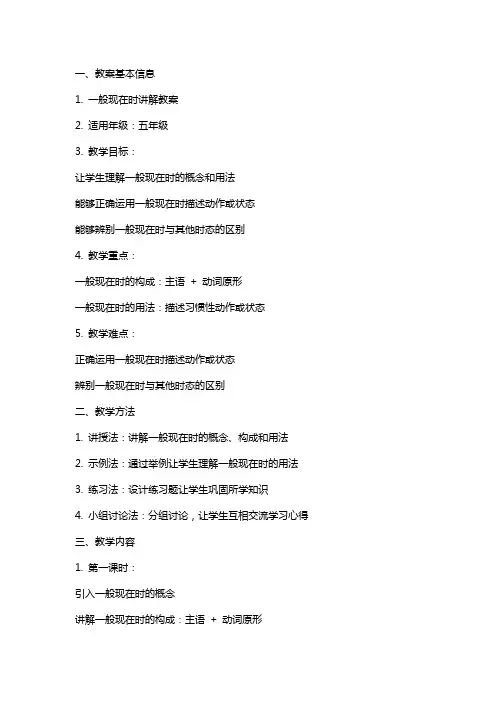
一、教案基本信息1. 一般现在时讲解教案2. 适用年级:五年级3. 教学目标:让学生理解一般现在时的概念和用法能够正确运用一般现在时描述动作或状态能够辨别一般现在时与其他时态的区别4. 教学重点:一般现在时的构成:主语+ 动词原形一般现在时的用法:描述习惯性动作或状态5. 教学难点:正确运用一般现在时描述动作或状态辨别一般现在时与其他时态的区别二、教学方法1. 讲授法:讲解一般现在时的概念、构成和用法2. 示例法:通过举例让学生理解一般现在时的用法3. 练习法:设计练习题让学生巩固所学知识4. 小组讨论法:分组讨论,让学生互相交流学习心得三、教学内容1. 第一课时:引入一般现在时的概念讲解一般现在时的构成:主语+ 动词原形举例说明一般现在时的用法:描述习惯性动作或状态2. 第二课时:通过示例让学生进一步理解一般现在时的用法讲解一般现在时与其他时态的区别(一般过去时、一般将来时)设计练习题,让学生辨别一般现在时与其他时态3. 第三课时:讲解一般现在时的否定句:主语+ do/does/did not + 动词原形讲解一般现在时的疑问句:do/does/did + 主语+ 动词原形设计练习题,让学生运用一般现在时的否定句和疑问句4. 第四课时:讲解一般现在时的被动语态:主语+ am/is/are + 过去分词举例说明一般现在时被动语态的用法设计练习题,让学生运用一般现在时的被动语态5. 第五课时:复习一般现在时的概念、构成和用法设计综合练习题,让学生全面运用一般现在时总结本节课时内容,布置课后作业四、教学评价1. 课后作业:检查学生对一般现在时的掌握程度2. 课堂练习:观察学生在练习中的表现,及时发现问题并进行针对性地讲解3. 小组讨论:评估学生在讨论中的参与程度和理解程度五、教学资源1. PPT课件:展示一般现在时的概念、用法、例子等2. 练习题:设计不同难度的练习题,巩固学生对一般现在时的掌握3. 小组讨论材料:提供相关话题,让学生进行小组讨论六、教学延伸活动1. 制作时间胶囊:让学生设想自己五年后的样子,用一般现在时描述自己的状态和习惯,将纸条放入时间胶囊中,约定五年后打开。
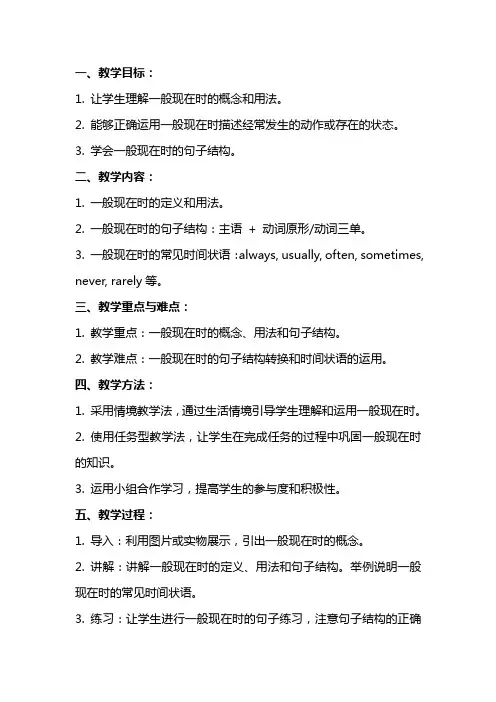
一、教学目标:1. 让学生理解一般现在时的概念和用法。
2. 能够正确运用一般现在时描述经常发生的动作或存在的状态。
3. 学会一般现在时的句子结构。
二、教学内容:1. 一般现在时的定义和用法。
2. 一般现在时的句子结构:主语+ 动词原形/动词三单。
3. 一般现在时的常见时间状语:always, usually, often, sometimes, never, rarely等。
三、教学重点与难点:1. 教学重点:一般现在时的概念、用法和句子结构。
2. 教学难点:一般现在时的句子结构转换和时间状语的运用。
四、教学方法:1. 采用情境教学法,通过生活情境引导学生理解和运用一般现在时。
2. 使用任务型教学法,让学生在完成任务的过程中巩固一般现在时的知识。
3. 运用小组合作学习,提高学生的参与度和积极性。
五、教学过程:1. 导入:利用图片或实物展示,引出一般现在时的概念。
2. 讲解:讲解一般现在时的定义、用法和句子结构。
举例说明一般现在时的常见时间状语。
3. 练习:让学生进行一般现在时的句子练习,注意句子结构的正确性。
4. 任务:布置一道生活情境题,让学生运用一般现在时完成任务。
5. 总结:对本节课的内容进行总结,强调一般现在时的关键点。
6. 作业:布置相关练习题,让学生巩固所学知识。
7. 课后反思:针对课堂教学效果,进行课后反思,为下一节课的教学做好准备。
六、教学评价:1. 评价学生对一般现在时的概念和用法的理解程度。
2. 评价学生能否正确运用一般现在时描述经常发生的动作或存在的状态。
3. 评价学生掌握一般现在时的句子结构和时间状语的运用情况。
七、教学资源:1. 课件:制作包含一般现在时定义、用法、句子结构和时间状语的课件。
2. 练习题:准备一些一般现在时的练习题,包括选择题、填空题和句子改写题。
3. 生活情境题:设计一些与学生生活相关的情境题,让学生运用一般现在时解决实际问题。
八、教学进度安排:1. 课时:本节课计划用2课时完成一般现在时的教学。
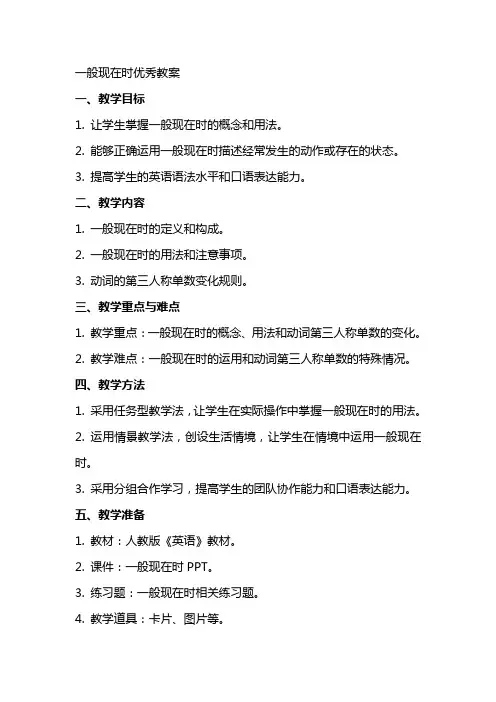
一般现在时优秀教案一、教学目标1. 让学生掌握一般现在时的概念和用法。
2. 能够正确运用一般现在时描述经常发生的动作或存在的状态。
3. 提高学生的英语语法水平和口语表达能力。
二、教学内容1. 一般现在时的定义和构成。
2. 一般现在时的用法和注意事项。
3. 动词的第三人称单数变化规则。
三、教学重点与难点1. 教学重点:一般现在时的概念、用法和动词第三人称单数的变化。
2. 教学难点:一般现在时的运用和动词第三人称单数的特殊情况。
四、教学方法1. 采用任务型教学法,让学生在实际操作中掌握一般现在时的用法。
2. 运用情景教学法,创设生活情境,让学生在情境中运用一般现在时。
3. 采用分组合作学习,提高学生的团队协作能力和口语表达能力。
五、教学准备1. 教材:人教版《英语》教材。
2. 课件:一般现在时PPT。
3. 练习题:一般现在时相关练习题。
4. 教学道具:卡片、图片等。
六、教学过程1. 导入:通过与学生谈论日常生活中的习惯和行为,引出一般现在时的概念。
2. 讲解:讲解一般现在时的定义、构成和用法,重点讲解动词第三人称单数的变化规则。
3. 互动:学生分组讨论,举例说明一般现在时的用法。
4. 练习:学生完成一般现在时的相关练习题,教师点评并讲解。
5. 拓展:引导学生运用一般现在时描述自己的家庭成员和朋友。
七、案例分析通过分析一些日常生活中的案例,让学生更好地理解和运用一般现在时。
例如:1. 描述自己的作息时间:I get up at 7 o'clock in the morning and go to school at 8 o'clock.2. 描述朋友的兴趣爱好:My friend likes playing soccer and he isa good player.八、课堂小结总结本节课所学内容,强调一般现在时的用法和动词第三人称单数的变化规则。
鼓励学生在日常生活中多运用一般现在时进行交流。
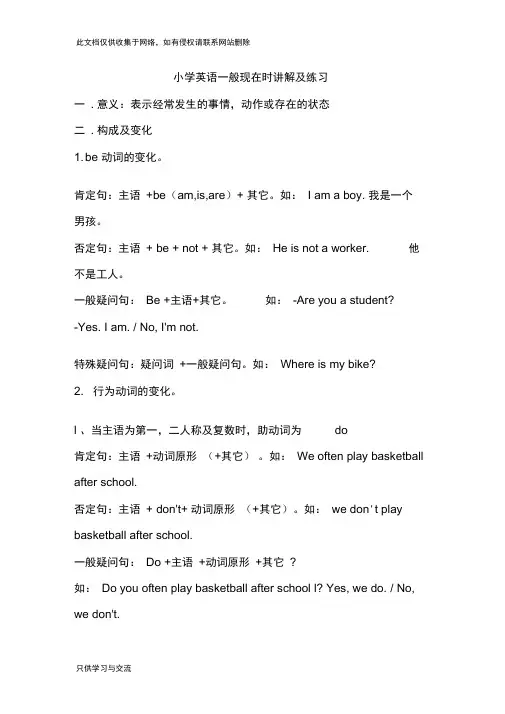
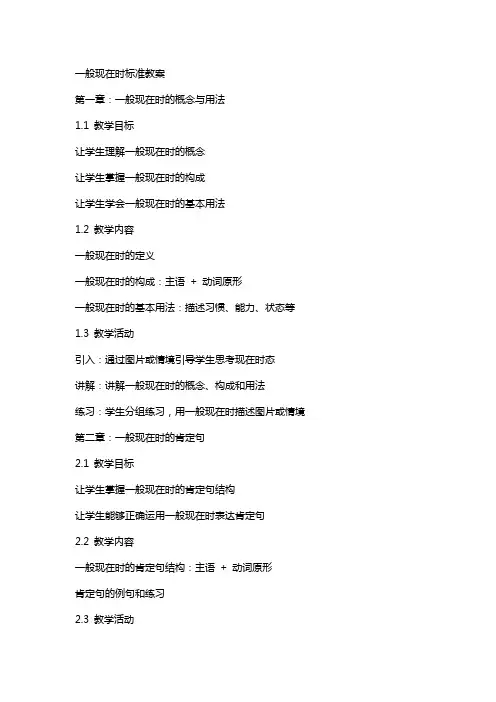
一般现在时标准教案第一章:一般现在时的概念与用法1.1 教学目标让学生理解一般现在时的概念让学生掌握一般现在时的构成让学生学会一般现在时的基本用法1.2 教学内容一般现在时的定义一般现在时的构成:主语+ 动词原形一般现在时的基本用法:描述习惯、能力、状态等1.3 教学活动引入:通过图片或情境引导学生思考现在时态讲解:讲解一般现在时的概念、构成和用法练习:学生分组练习,用一般现在时描述图片或情境第二章:一般现在时的肯定句2.1 教学目标让学生掌握一般现在时的肯定句结构让学生能够正确运用一般现在时表达肯定句2.2 教学内容一般现在时的肯定句结构:主语+ 动词原形肯定句的例句和练习2.3 教学活动讲解:讲解一般现在时的肯定句结构和例句练习:学生分组练习,用一般现在时构造肯定句第三章:一般现在时的否定句3.1 教学目标让学生掌握一般现在时的否定句结构让学生能够正确运用一般现在时表达否定句3.2 教学内容一般现在时的否定句结构:主语+ do/does/did not + 动词原形否定句的例句和练习3.3 教学活动引入:通过图片或情境引导学生思考一般现在时的否定句讲解:讲解一般现在时的否定句结构和例句练习:学生分组练习,用一般现在时构造否定句第四章:一般现在时的疑问句4.1 教学目标让学生掌握一般现在时的疑问句结构让学生能够正确运用一般现在时表达疑问句4.2 教学内容一般现在时的疑问句结构:do/does/did + 主语+ 动词原形疑问句的例句和练习4.3 教学活动讲解:讲解一般现在时的疑问句结构和例句练习:学生分组练习,用一般现在时构造疑问句第五章:一般现在时的特殊句型5.1 教学目标让学生掌握一般现在时的特殊句型让学生能够正确运用一般现在时表达特殊句型5.2 教学内容一般现在时的特殊句型:there be句型、have/has句型特殊句型的例句和练习5.3 教学活动引入:通过图片或情境引导学生思考一般现在时的特殊句型讲解:讲解一般现在时的特殊句型结构和例句练习:学生分组练习,用一般现在时构造特殊句型第六章:一般现在时的常用动词6.1 教学目标让学生掌握一般现在时中常用的动词让学生能够正确运用这些动词构造一般现在时句子6.2 教学内容常用动词列表及其用法动词第三人称单数形式的变化规则动词练习及应用引入:通过情境或故事引入常用动词讲解:讲解常用动词的第三人称单数形式及用法练习:学生分组练习,用常用动词构造一般现在时句子第七章:一般现在时的语境应用7.1 教学目标让学生能够理解一般现在时的语境让学生在实际情境中正确运用一般现在时7.2 教学内容一般现在时的常见语境:日常生活、规律习惯、普遍事实等情境对话及应用练习7.3 教学活动引入:通过图片或情境介绍一般现在时的语境讲解:讲解一般现在时的常见语境及应用练习:学生分组进行情境对话,运用一般现在时第八章:一般现在时的主谓一致8.1 教学目标让学生掌握一般现在时主谓一致的规则让学生能够正确运用主谓一致构造一般现在时句子8.2 教学内容主谓一致的规则:名词单数、复数及不可数名词的主谓一致主谓一致的练习及应用引入:通过例句引导学生思考主谓一致的问题讲解:讲解主谓一致的规则及注意事项练习:学生分组练习,注意主谓一致运用一般现在时句子第九章:一般现在时的综合练习9.1 教学目标让学生综合运用一般现在时的知识提高学生的一般现在时运用能力9.2 教学内容综合练习题:选择、填空、翻译等练习及解答9.3 教学活动引入:通过情境或故事引入综合练习讲解:讲解练习题的解题思路及方法练习:学生独立完成练习题,教师点评及讲解第十章:一般现在时的拓展与应用10.1 教学目标让学生进一步拓展一般现在时的知识提高学生的一般现在时应用能力10.2 教学内容拓展知识:一般现在时的其他用法及注意事项应用练习:故事创作、情境表演等引入:通过情境或故事引入拓展知识讲解:讲解一般现在时的其他用法及注意事项练习:学生进行故事创作或情境表演,运用一般现在时重点和难点解析一、一般现在时的概念与用法重点环节:理解一般现在时的概念和用法。
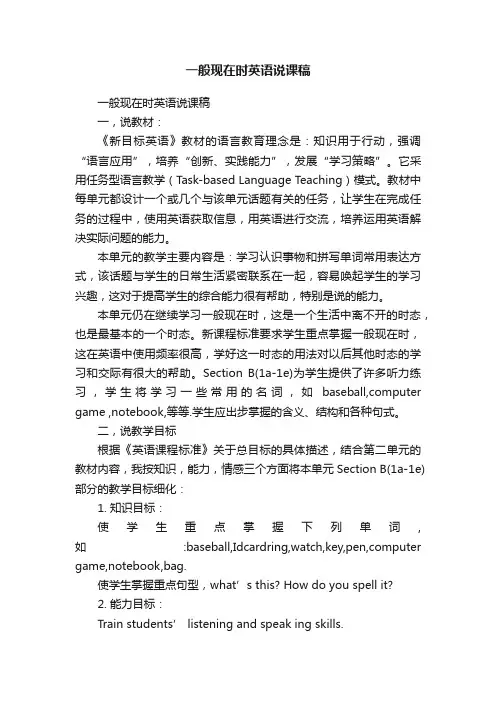
一般现在时英语说课稿一般现在时英语说课稿一,说教材:《新目标英语》教材的语言教育理念是:知识用于行动,强调“语言应用”,培养“创新、实践能力”,发展“学习策略”。
它采用任务型语言教学(Task-based Language Teaching)模式。
教材中每单元都设计一个或几个与该单元话题有关的任务,让学生在完成任务的过程中,使用英语获取信息,用英语进行交流,培养运用英语解决实际问题的能力。
本单元的教学主要内容是:学习认识事物和拼写单词常用表达方式,该话题与学生的日常生活紧密联系在一起,容易唤起学生的学习兴趣,这对于提高学生的综合能力很有帮助,特别是说的能力。
本单元仍在继续学习一般现在时,这是一个生活中离不开的时态,也是最基本的一个时态。
新课程标准要求学生重点掌握一般现在时,这在英语中使用频率很高,学好这一时态的用法对以后其他时态的学习和交际有很大的帮助。
Section B(1a-1e)为学生提供了许多听力练习,学生将学习一些常用的名词,如baseball,computer game ,notebook,等等.学生应出步掌握的含义、结构和各种句式。
二,说教学目标根据《英语课程标准》关于总目标的具体描述,结合第二单元的教材内容,我按知识,能力,情感三个方面将本单元Section B(1a-1e)部分的教学目标细化:1. 知识目标:使学生重点掌握下列单词, 如:baseball,Idcardring,watch,key,pen,computer game,notebook,bag.使学生掌握重点句型,what’s this? How do you spell it?2. 能力目标:Train students’ listening and speak ing skills.Train students’ communicative competence.3,情感目标Everyone in school like the school life verymuch.4.教学重点Key Vocabulary.Target language5.教学难点Practice the adjectives using thetarget language三,说教法根据以上对教材的分析,结合学生已掌握的知识,本课我将使用任务型教学法,以活动教学为主,合作学习贯穿课堂,在教学中采取以教师为主导,学生为主体的各种互动方式进行教学,,以此不断提高学生听、说能力;通过播放听力录音帮助学生熟悉听力教学技巧,引导他们理解对方问路、指路需求,熟练指明方向;积极创设有利英语语言环境,不断提高学生英语学习兴趣与激情,引导他们熟练运用英语听、说、读、写、译综合技能。
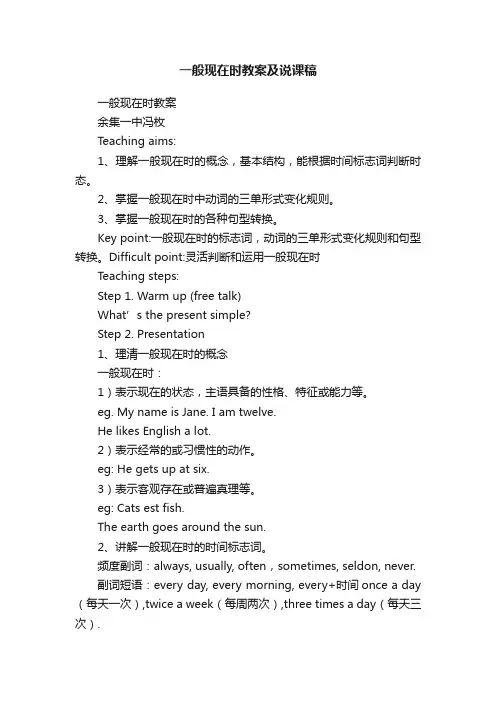
一般现在时教案及说课稿一般现在时教案余集一中冯枚Teaching aims:1、理解一般现在时的概念,基本结构,能根据时间标志词判断时态。
2、掌握一般现在时中动词的三单形式变化规则。
3、掌握一般现在时的各种句型转换。
Key point:一般现在时的标志词,动词的三单形式变化规则和句型转换。
Difficult point:灵活判断和运用一般现在时Teaching steps:Step 1. Warm up (free talk)What’s the present simple?Step 2. Presentation1、理清一般现在时的概念一般现在时:1)表示现在的状态,主语具备的性格、特征或能力等。
eg. My name is Jane. I am twelve.He likes English a lot.2)表示经常的或习惯性的动作。
eg: He gets up at six.3)表示客观存在或普遍真理等。
eg: Cats est fish.The earth goes around the sun.2、讲解一般现在时的时间标志词。
频度副词:always, usually, often,sometimes, seldon, never.副词短语:every day, every morning, every+时间once a day (每天一次),twice a week(每周两次),three times a day(每天三次).3、含有be动词的一般现在时展示:肯定句:I am from china.由学生抢答说出:否定句:I am not from china.一般疑问句:Are you fr om china? Yes, I am/No, I’m not.特殊疑问句:Where are you from?总结:肯定句:主语+be+其他否定句:主语+be+not+其他一般疑问句:Be+主语+其他Yes,主语+beNo,主语+be+not特殊疑问句:疑问句+一般疑问句?含有实义动词的一般现在时展示:肯定句:I come from china.由学生抢答说出:否定句:I don’t c ome from china.一般疑问句:Do you come from china?特殊疑问句:Where do you come from?展示:肯定句:He comes from china.由学生抢答说出:否定句:He doesn’t come from china.一般疑问句:Does he come from china?Yes, He close./No, he cloesn’t.特殊疑问句:Where does he come from?总结:肯定句:主语+动词原形/动词三单式+其他否定句:主语+don’t/doesn’t+动词原形+其他一般疑问句:Do/Does+主语+动词原形+其他?Yes, 主语+do/does./No,主语+don’t/doesn’t.特殊疑问句:疑问词+一般疑问句?4、牢记动词的第三人称单数变化规则,并知道哪些词属于第三人称单数。
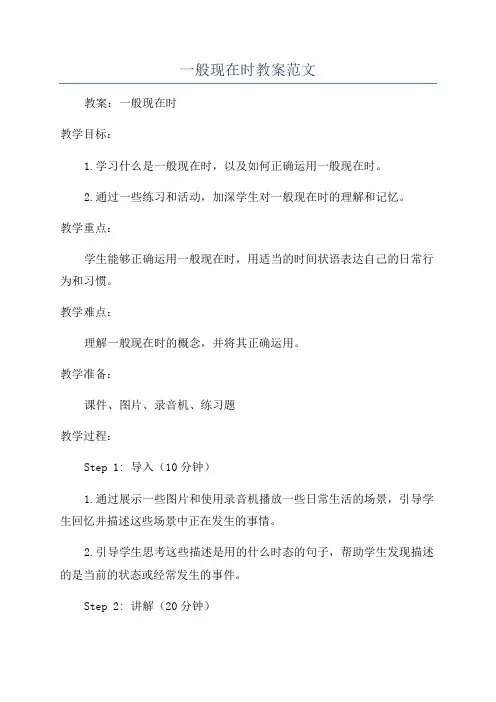
一般现在时教案范文教案:一般现在时教学目标:1.学习什么是一般现在时,以及如何正确运用一般现在时。
2.通过一些练习和活动,加深学生对一般现在时的理解和记忆。
教学重点:学生能够正确运用一般现在时,用适当的时间状语表达自己的日常行为和习惯。
教学难点:理解一般现在时的概念,并将其正确运用。
教学准备:课件、图片、录音机、练习题教学过程:Step 1: 导入(10分钟)1.通过展示一些图片和使用录音机播放一些日常生活的场景,引导学生回忆并描述这些场景中正在发生的事情。
2.引导学生思考这些描述是用的什么时态的句子,帮助学生发现描述的是当前的状态或经常发生的事件。
Step 2: 讲解(20分钟)1.明确一般现在时的用法和含义:用于表达当前状态或者经常发生的行为、习惯等。
2. 引导学生探究一般现在时的构成:主语 + 动词原形(第三人称单数需加-s/es)。
3.通过例句和练习,帮助学生理解一般现在时的用法和构成,并解答学生对于一般现在时的问题。
4.引导学生思考时间状语对一般现在时的影响,通过时间状语的变化来比较动词时态的变化。
Step 3: 练习(30分钟)1.设计一些练习题,让学生进行实际操作,巩固一般现在时的用法和构成。
2.给学生一些句子,让他们将其改写成一般现在时,并提供反馈和订正。
3.给学生一些情景或者图片,让他们用一般现在时进行描述,并与同桌进行交流比较,鼓励他们发挥创造力。
Step 4: 拓展(10分钟)1.引导学生思考一般现在时的常见错误,如主谓一致、动词形式错误等。
2.通过对常见错误的讲解和例子的演示,帮助学生避免这些错误,并提高语言表达的准确性。
Step 5: 总结(5分钟)1.总结一般现在时的用法和构成。
2.引导学生回顾今天所学内容,并进行思考反馈。
Step 6: 作业(5分钟)布置一些相关的家庭作业,如完成练习题、写一篇关于自己日常生活的短文等。
教学反思:通过本节课的学习,学生能够对一般现在时有了较为全面的了解,并能正确运用一般现在时来描述日常生活和习惯。
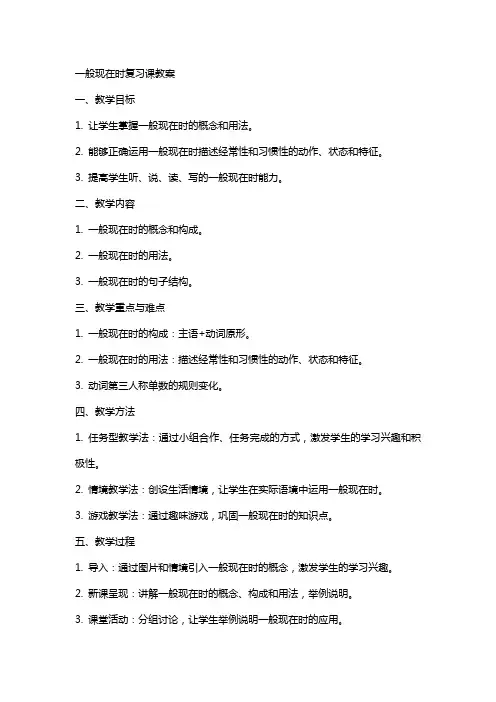
一般现在时复习课教案一、教学目标1. 让学生掌握一般现在时的概念和用法。
2. 能够正确运用一般现在时描述经常性和习惯性的动作、状态和特征。
3. 提高学生听、说、读、写的一般现在时能力。
二、教学内容1. 一般现在时的概念和构成。
2. 一般现在时的用法。
3. 一般现在时的句子结构。
三、教学重点与难点1. 一般现在时的构成:主语+动词原形。
2. 一般现在时的用法:描述经常性和习惯性的动作、状态和特征。
3. 动词第三人称单数的规则变化。
四、教学方法1. 任务型教学法:通过小组合作、任务完成的方式,激发学生的学习兴趣和积极性。
2. 情境教学法:创设生活情境,让学生在实际语境中运用一般现在时。
3. 游戏教学法:通过趣味游戏,巩固一般现在时的知识点。
五、教学过程1. 导入:通过图片和情境引入一般现在时的概念,激发学生的学习兴趣。
2. 新课呈现:讲解一般现在时的概念、构成和用法,举例说明。
3. 课堂活动:分组讨论,让学生举例说明一般现在时的应用。
4. 语法练习:设计一些练习题,让学生区分一般现在时和其他时态。
5. 口语练习:创设生活情境,让学生用一般现在时进行口语交流。
6. 课堂小结:总结一般现在时的知识点,强调重点和难点。
7. 作业布置:设计一些课后练习题,巩固所学知识。
8. 教学反思:对课堂教学进行总结和反思,为下一步教学做好准备。
六、教学评价1. 评价方式:课堂表现、语法练习、口语练习、课后作业。
2. 评价标准:a. 课堂表现:积极参与讨论、回答问题准确。
b. 语法练习:正确运用一般现在时描述动作、状态和特征。
c. 口语练习:能够用一般现在时进行日常交流。
d. 课后作业:完成练习题,错误率较低。
七、课后作业1. 复习一般现在时的概念和用法。
2. 完成课后练习题,巩固一般现在时的知识点。
3. 运用一般现在时描述自己的日常活动和习惯。
八、教学拓展1. 对比一般现在时和一般过去时的区别。
2. 引导学生思考一般现在时在实际生活中的应用。
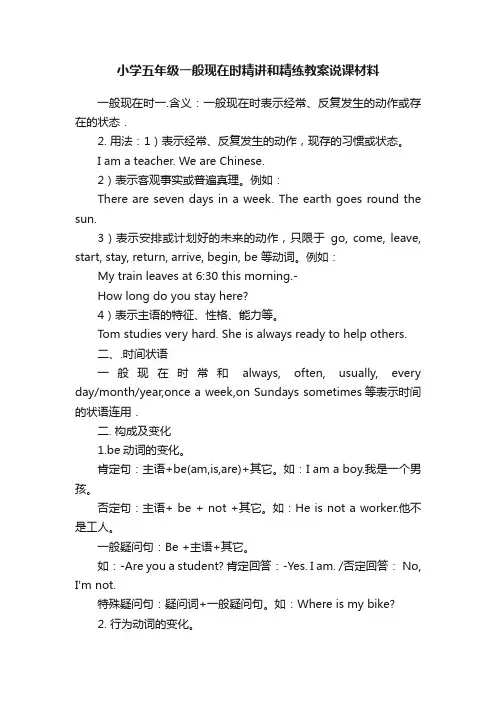
小学五年级一般现在时精讲和精练教案说课材料一般现在时一.含义:一般现在时表示经常、反复发生的动作或存在的状态.2. 用法:1)表示经常、反复发生的动作,现存的习惯或状态。
I am a teacher. We are Chinese.2)表示客观事实或普遍真理。
例如:There are seven days in a week. The earth goes round the sun.3)表示安排或计划好的未来的动作,只限于go, come, leave, start, stay, return, arrive, begin, be 等动词。
例如:My train leaves at 6:30 this morning.-How long do you stay here?4)表示主语的特征、性格、能力等。
Tom studies very hard. She is always ready to help others.二、.时间状语一般现在时常和always, often, usually, every day/month/year,once a week,on Sundays sometimes等表示时间的状语连用.二. 构成及变化1.be动词的变化。
肯定句:主语+be(am,is,are)+其它。
如:I am a boy.我是一个男孩。
否定句:主语+ be + not +其它。
如:He is not a worker.他不是工人。
一般疑问句:Be +主语+其它。
如:-Are you a student? 肯定回答:-Yes. I am. /否定回答: No, I'm not.特殊疑问句:疑问词+一般疑问句。
如:Where is my bike?2. 行为动词的变化。
1)、行为动词在一般现在时中的用法:一般人称的谓语动词用原形.,但单数第三人称做主语时谓语动词词尾发生变化:即.动词词尾加-s;或.-es,动词遇到单数第三人称时的表示方法在一般现在时中, 当主语是单数第三人称时, 行为动词的形式是在词尾加-s 或–es具体方法如下:(1)多数动词直接加s:runs gets likes collets takes pla ys climbs…….(2)结尾是s, x, sh, ch, o,前为辅音字母,结尾加es : watches teaches goes does washes crosses mixes brushes(3)动词末尾y前为辅音:将y改为i加es: study→studies fly→fliescarry→carriescry→cries但在y前如果为元音则直接加s: buys says注意: 动词加-s 以后的读音.1.在[p] [t] [k] [f] 等清辅音后,发清辅音/s/ eg. helps , works, likes,hates ,laughs2.在浊辅音和元音后,发浊辅音/z/ eg. drives, cleans, plays3.在[s] [z] [∫ ] [] 后,发/iz/ eg.rises, wishes, teaches, urges4.在[t] [d]后,发/ts/ /dz/ eg. fits, sets, needs5. 其他情况下发[z] eg. plans, cries, shows2、.否定形式:主语是第三人称单数,在行为动词前加doesn’t.行为动词变为原形。
一般现在时复习课教案一、教学目标:1. 让学生掌握一般现在时的概念和用法。
2. 能够正确运用一般现在时描述经常发生的动作或存在的状态。
3. 提高学生的听说读写能力,巩固已学知识。
二、教学内容:1. 一般现在时的概念和构成。
2. 一般现在时的用法。
3. 动词的第三人称单数形式。
三、教学重点与难点:1. 教学重点:一般现在时的用法和动词第三人称单数形式的正确运用。
2. 教学难点:动词第三人称单数形式的变换。
四、教学方法:1. 任务型教学法:通过完成各种任务,让学生在实践中运用语言。
2. 情景教学法:创设真实的情景,让学生在实际语境中学习。
3. 互动式教学法:鼓励学生积极参与,提高课堂氛围。
五、教学过程:1. 导入:复习一般现在时的概念和用法,引导学生回顾已学知识。
2. 新课内容:讲解一般现在时的构成和动词第三人称单数形式的变换。
3. 实例分析:通过例句和练习,让学生掌握一般现在时的用法和动词第三人称单数形式的正确运用。
4. 课堂互动:分组练习,让学生在实际语境中运用一般现在时。
5. 课后作业:布置相关练习题,巩固所学知识。
六、教学评估:1. 课堂观察:观察学生在课堂上的参与程度、听说读写能力的运用和对待学习的态度。
2. 练习完成情况:检查学生完成练习的情况,包括正确性和完整性。
3. 课后作业:评估学生完成课后作业的质量,包括语法正确性和表达的准确性。
七、拓展活动:1. 小组讨论:让学生分组讨论一般现在时在日常生活对话中的应用,并准备进行分享。
2. 角色扮演:学生分组进行角色扮演,模拟使用一般现在时的场景,增强实际应用能力。
八、课程资源:1. 教材:使用适合学生水平的英语教材,提供相关知识点的学习和练习。
2. 多媒体资源:利用PPT、视频、音频等多媒体资源,生动展示一般现在时的用法。
3. 网络资源:引导学生利用网络资源,如在线英语学习平台,进行自主学习和拓展。
九、教学反思:1. 课堂掌控:反思教学过程中对课堂节奏的掌控是否得当,学生是否能够跟上教学进度。
一般现在时标准教案一、教学目标1. 让学生掌握一般现在时的概念和用法。
2. 能够正确运用一般现在时描述经常性和习惯性的动作、状态和特征。
3. 学会使用一般现在时的be动词和行为动词。
4. 能够听懂、说出一般现在时的句子。
二、教学内容1. 一般现在时的概念和用法。
2. be动词(am, is, are)的用法。
3. 行为动词(have, do, go, e, leave, arrive, eat, drink, sleep, read, write, listen, speak, etc.)的用法。
三、教学重点1. 一般现在时的结构:主语+ be动词+ 表语;主语+ 行为动词+ 宾语。
2. be动词的用法和辨析。
3. 行为动词的用法和辨析。
四、教学难点1. be动词在一般现在时的用法,特别是在主语为第三人称单数时。
2. 行为动词在一般现在时的用法,特别是在描述经常性和习惯性的动作、状态和特征时。
五、教学方法1. 任务型教学法:通过小组合作、角色扮演等活动,让学生在实际语境中运用一般现在时。
2. 情境教学法:创设生活情境,让学生在真实环境中感受和理解一般现在时。
3. 游戏教学法:设计趣味游戏,激发学生的学习兴趣,提高学生的参与度。
六、教学准备1. 教学PPT或黑板。
2. 教学卡片或图片。
3. 练习册和作业本。
4. 录音机或播放器。
5. 教学游戏材料。
七、教学过程1. 导入:通过歌曲、游戏或日常对话引入一般现在时的话题。
2. 呈现:用PPT、卡片或图片展示一般现在时的结构和相关词汇。
3. 讲解:讲解一般现在时的概念、用法和be动词、行为动词的辨析。
4. 练习:分组练习,让学生用一般现在时描述自己和同学的特征、习惯和动作。
5. 互动:学生之间进行对话,运用一般现在时进行交流。
6. 巩固:通过游戏、竞赛等活动巩固所学内容。
八、课堂作业1. 用一般现在时完成句子:I ____________________ (read) a book.She ____________________ (have) lunch at 12 o'clock.They ____________________ (go) to school bus.2. 编写一段对话,运用一般现在时描述日常生活中的事情。
小学一般现在时教案【教学目标】1.通过本节课的学习,使学生了解并掌握现在时的用法。
2.能够正确运用现在时进行简单的句子构造。
3.能够在写作和口语中正确运用一般现在时。
【教学重点】1.现在时的基本意义及用法。
2.现在时的一般陈述句的句式。
3.现在时的一般疑问句与否定句的句式。
【教学难点】1.能够准确说出现在时的基本用法。
2.能够熟练运用现在时进行简单的句子构造。
【教学准备】1.讲稿。
2.活动设计。
3.多媒体课件。
【教学过程】Step 1:导入 (5分钟)1.教师通过课件呈现一个家庭照片,并用现在时介绍照片中的人物和情况。
2.引导学生说出句子中的动词形式,引导学生总结如何形成现在时。
Step 2:输入新知 (10分钟)1.教师通过课件向学生展示现在时的基本用法,包括表示现在的动作、状况、习惯等。
2.教师通过多个例子和图片,帮助学生理解现在时的用法。
3.教师解释现在时的基本构成,即主语+动词原形。
Step 3:小组活动 (15分钟)1.将学生分成小组,让他们以现在时描述自己的家人和朋友。
2.学生互相询问对方的家人或朋友,要求使用现在时构造句子。
3.教师巡视并指导学生进行对话。
Step 4:情景操练 (15分钟)1.教师通过图片呈现一系列情景,要求学生用现在时描述情景中的人物和情况。
2.学生主动上台描述图片中人物的活动,并与同学一起讨论句子的正确性。
3.教师就学生的表现给予肯定和指导。
Step 5:巩固练习 (15分钟)1.教师提供一些现在时的练习题,让学生完成。
2.学生独立完成练习题,并相互核对答案。
3.教师对学生的答案进行评价和指导。
Step 6:拓展延伸 (10分钟)1.教师通过图片和故事情节,引导学生发现故事中的动作和情况所表达的时间。
2.学生尝试用现在时叙述故事中的事件,加深对现在时的理解。
Step 7:总结归纳 (5分钟)1.教师通过展示现在时的用法和基本构成,让学生对本节课的内容进行总结归纳。
千里之行,始于足下。
小学英语语法时态讲解与归纳一般现在时讲课教案【教学目标】1. 知识与技能:学生能够掌握一般现在时的基本用法和构成规则。
2. 过程与方法:通过讲解、练习和小组合作等多种教学方法,激发学生的学习兴趣,提高英语语法的理解和运用能力。
3. 情感态度和价值观:培养学生对英语学习的积极态度,激发学生自信心,提高学生的自主学习能力。
【教学重点】掌握一般现在时的基本用法和构成规则。
【教学难点】一般现在时的特殊疑问句和否定句。
【教学过程】一、导入(5分钟)1. T: Good morning, boys and girls! Today, let's learn about the present simple tense. Do you know what the present simple tense is?2. Ss: It's a tense that describes things that always happen or are true.3. T: That's right! Now, let's look at some sentences. Can youtell me which tense they are in?4. Ss: OK.T: He loves basketball.S1: It is in the present simple tense.第1页/共3页锲而不舍,金石可镂。
T: He is loving basketball.S2: It is in the present continuous tense.T: He will love basketball.S3: It is in the future simple tense.T: Great job! So, today we are going to learn about the present simple tense. Are you ready?二、讲解(10分钟)1. T: There are three main reasons to use the present simple tense: habits and routines, general truths, and permanent situations. Let's look at some examples.- I usually get up at 7 o'clock every morning. (habit/routine) - The sun rises in the east. (general truth)- Water boils at 100 degrees Celsius. (general truth)- I live in Beijing. (permanent situation)2. T: So, the present simple tense is used to talk about things that happen regularly, things that are always true, and things that are always the case. Do you understand?Ss: Yes.3. T: Now, let's see how to form the present simple tense. For most verbs, we just add -s or -es to the base form of the verb. For example:- He plays basketball every day.- She likes to read books.- They watch TV every evening.- The cat meows at night.4. T: However, there are some spelling rules we need to pay attention to. If the verb ends in -y, we change the -y to -ies. For example:- He studies English.千里之行,始于足下。
一般现在时教案【教案】一般现在时教学目标:1. 学生能理解和使用一般现在时的基本用法。
2. 学生能正确使用一般现在时谈论日常生活和常见情况。
3. 学生能通过练习巩固所学内容。
教学重点:1. 一般现在时的概念和用法。
2. 一般现在时的肯定、否定和疑问句的构成。
3. 一般现在时的时间状语的使用。
教学准备:1. 课件和投影仪。
2. 一些练习题和活动。
教学过程:Step 1: 导入(5分钟)教师可以通过投影片或者实物向学生展示一些日常活动的图片,如吃饭、睡觉、上学等。
然后与学生一起讨论这些活动是什么时候发生的,以引出一般现在时。
Step 2: 讲解(15分钟)2.1 教师通过幻灯片或板书向学生介绍一般现在时的定义和用法。
例如每天、经常、通常等时间状语表示反复或习惯性的动作或状态。
2.2 教师向学生解释一般现在时的肯定、否定和疑问句的构成规则,并通过例句进行示范。
Step 3: 练习(20分钟)3.1 利用教材中的练习题让学生进行练习,巩固所学内容。
3.2 通过游戏或小组活动的形式,让学生互相提问和回答关于日常生活的问题,以练习一般现在时的用法。
Step 4: 拓展(10分钟)4.1 教师可以向学生展示一些包含一般现在时的实际应用场景,如日记、个人介绍等。
并引导学生在这些场景中运用一般现在时进行表达。
4.2 教师鼓励学生运用所学的一般现在时进行口头表达,并提供相关的话题进行讨论。
Step 5: 总结(5分钟)教师通过回顾一般现在时的定义、用法和构成规则,让学生对本节课所学的内容进行总结。
Step 6: 作业布置(5分钟)布置作业,要求学生根据所给的情境写一篇关于自己日常生活的文章,要求用到一般现在时。
Step 7: 课堂小结(5分钟)对学生的表现进行总结评价,并回答学生的问题。
教学反思:本节课主要通过简单的导入和讲解,帮助学生理解和掌握一般现在时的基本用法,然后通过练习和活动巩固所学内容,并鼓励学生进行口头表达。
一般现在时复习课教案一、教学目标:1. 让学生掌握一般现在时的构成和用法。
2. 提高学生运用一般现在时进行交际的能力。
3. 培养学生的语法意识和语言运用能力。
二、教学内容:1. 一般现在时的构成:主语+ 动词原形。
2. 一般现在时的用法:描述习惯性动作、经常发生的事情和普遍真理。
3. 动词分类:规则动词和不规则动词。
三、教学重点与难点:1. 教学重点:一般现在时的构成和用法。
2. 教学难点:不规则动词的掌握。
四、教学方法:1. 任务型教学法:通过完成各种任务,让学生在实践中运用一般现在时。
2. 情景教学法:创设各种情景,让学生在真实的语境中学习一般现在时。
3. 互动式教学法:鼓励学生积极参与,进行小组讨论和问答。
五、教学步骤:1. 导入:以一段对话引入一般现在时的概念,让学生听懂并回答相关问题。
2. 新课内容:讲解一般现在时的构成和用法,举例说明。
3. 练习:让学生完成一些填空题,巩固一般现在时的用法。
4. 小组活动:学生分组,进行角色扮演,运用一般现在时进行交际。
5. 总结:对本节课的内容进行总结,强调一般现在时的用法和注意事项。
6. 作业布置:让学生课后用一般现在时写一篇小短文,描述自己的日常习惯。
7. 课后反思:教师对本节课的教学效果进行反思,为下一节课做好准备。
六、教学评估:1. 课堂观察:观察学生在课堂上的参与程度、发音准确性以及语法运用是否正确。
2. 练习答案:检查学生完成练习的情况,对错误进行纠正并给予反馈。
3. 小组活动评估:评估学生在角色扮演中的表现,关注一般现在时的正确使用。
4. 课后作业:批改学生课后作业,检查一般现在时的应用情况和语法准确性。
七、拓展活动:1. 制作动词分类表格:让学生课后整理规则动词和不规则动词的列表。
2. 制作语法卡片:学生可以制作一般现在时的语法知识点卡片,方便复习。
3. 网上搜索:让学生利用网络资源,寻找一般现在时的例句并进行分析。
八、课程资源:1. 教材:选用合适的英语教材,如《新概念英语》、《牛津英语》等。
一般现在时一.含义:一般现在时表示经常、反复发生的动作或存在的状态.2. 用法:1)表示经常、反复发生的动作,现存的习惯或状态。
I am a teacher. We are Chinese.2)表示客观事实或普遍真理。
例如:There are seven days in a week. The earth goes round the sun.3)表示安排或计划好的未来的动作,只限于go, come, leave, start, stay, return, arrive, begin, be 等动词。
例如:My train leaves at 6:30 this morning.-How long do you stay here?4)表示主语的特征、性格、能力等。
Tom studies very hard. She is always ready to help others.二、.时间状语一般现在时常和always, often, usually, every day/month/year,once a week,on Sundays sometimes等表示时间的状语连用.二. 构成及变化1.be动词的变化。
肯定句:主语+be(am,is,are)+其它。
如:I am a boy.我是一个男孩。
否定句:主语+ be + not +其它。
如:He is not a worker.他不是工人。
一般疑问句:Be +主语+其它。
如:-Are you a student? 肯定回答:-Yes. I am. /否定回答: No, I'm not.特殊疑问句:疑问词+一般疑问句。
如:Where is my bike?2. 行为动词的变化。
1)、行为动词在一般现在时中的用法:一般人称的谓语动词用原形.,但单数第三人称做主语时谓语动词词尾发生变化:即.动词词尾加-s;或.-es,动词遇到单数第三人称时的表示方法在一般现在时中, 当主语是单数第三人称时, 行为动词的形式是在词尾加-s 或–es具体方法如下:(1)多数动词直接加s:runs gets likes collets takes plays climbs…….(2)结尾是s, x, sh, ch, o,前为辅音字母,结尾加es : watches teaches goes does washes crosses mixes brushes(3)动词末尾y前为辅音:将y改为i加es: study→studies fly→fliescarry→carriescry→cries但在y前如果为元音则直接加s: buys says注意: 动词加-s 以后的读音.1.在[p] [t] [k] [f] 等清辅音后,发清辅音/s/ eg. helps , works, likes,hates ,laughs2.在浊辅音和元音后,发浊辅音/z/ eg. drives, cleans, plays3.在[s] [z] [∫ ] [] 后,发/iz/ eg.rises, wishes, teaches, urges4.在[t] [d]后,发/ts/ /dz/ eg. fits, sets, needs5. 其他情况下发[z] eg. plans, cries, shows2、.否定形式:主语是第三人称单数,在行为动词前加doesn’t. 行为动词变为原形。
其余人称作主语时,都在行为动词前加don’tHe likes reading books. 变否定句He doesn’t like reading books.I like playing football. 变否定句I don’t like playing football.3、.一般疑问句:主语是第三人称单数的,将助动词does提前,行为动词变为原形。
其余人称作主语,将助动词do提前,句号变问号。
主语I ,we 变you ; some 变any .1).He likes reading books. 变一般疑问句:Does he like reading books?肯定回答:Yes, he does. 否定回答:No, he doesn’t.2).I like playing football. 变一般疑问句:Do you like playing football?肯定回答:Yes, I do.否定回答:No, I don’t.3).We like nice flowers. 变一般疑问句:Do you like nice flowers?肯定回答:Yes, we do.否定回答:No, we don’t.一般现在时的四个基本句型总结谓语动词是be 谓语动词是do主语是:第三人称单数主语是:非第三人称单数am/ is/ are does do肯定句He is a teacher. He goes to school every day. They go to school every day.否定句He is not ateacher. He doesn’t goto school every day. They don’t go to school everyday.一般疑问句Is he a teacher? Does he go to school every day? Do they go to school every day?Yes, he is. No, he isn’t.Yes, he does.No, he doesn’t.Yes, they do.No, they don’t.特殊疑问What is he? What does he do every day? What do they do every day?句一般现在时:表示经常性的事情。
1、时间状语:often经常, usually通常, always总是,every每个, sometimes有时,at…在几点钟注意:只有第三人称单数用动词三单,其余动词均用原形三单变化:1)、多数在动词后加s :play—plays like—likes2)、以s,x,sh,ch,o结尾的动词加es :go—goes wash--washes3)、以辅音字母加y结尾,把y改i再加es :fly—flies练一练1.We often___________(play) in the playground.2. He _________(get) up at six o’clock.3.__________you _________(brush) your teeth every morning.4. What (do) he usually (do) after school?5. Danny (study) English, Chinese, math, Science and Art at school.6. Mike sometimes __________(go) to the park with his sister.7. At eight at night, she __________(watch) TV with his parents.8.________ Mike________(read) English every day?9. How many lessons _________your classmate________(have) on Monday?10. What time _________his mother_________(do) the housework?改句子1.Do you often play football after school? (肯定回答)2.I have many books. (改为否定句)s playing table tennis (改为否定句)3.Gao Shan’s sister like4.She lives in a small town near New York. (改为一般疑问句)5.I watch TV every day. (改为一般疑问句)6.David has a goal. (改为一般疑问句)7.We have four lessons.(否定句)(肯定句)8.Nancy doesn’t run fast9.My dog runs fast. (否定句,一般疑问句)10.Mike has two letters for him. 一般疑问句,否定句:11.I usually play football on Friday afternoon. 否定句,一般疑问句:12.Su Yang usually washes some clothes on Saturday.否定句:一般疑问句:划线提问:13. Su Yang usually washes some clothes on Saturday.(划线提问)14. Mingming usually waters the flowers every day否定句:一般疑问句:划线提问15.Tom does his homework at home.否定句:一般疑问句:划线提问:Mr. BlackMr. Black teaches (教授) us English this term(学期). He is a tall man. He likes wearing a white shirt and black trousers. He speaks English very well. We like his lessons(功课)very much.His home is near the school. Sometimes Mr. Black walks to his home. He has two little sons. They look the same. They often wear the same clothes(衣服). He loves to see them and play with them. Mr. Black calls(称呼) the two boys Da Mao and Xiao Mao.Tick or cross( ) 21. Mr. Black is our English teacher.( ) 22. Mr. Black is very short.( ) 23. We don’t like his lessons.( ) 24. Maybe Da Mao and Xiao Mao are twin brothers.( ) 25. Mr. Black can speak Chinese well.Answer:26. Do the pupils like Mr. Black’s lessons? _________________________27. What does Black like to wear? ______________________________28. Is Mr. Black’s home far from the school? ______________________29. Does Mr. Black like to play with his children? ___________________30. Does Mr. Black have a daughter(女儿)? _______________________A Clock and a WatchWe can tell time by a clock or by a watch. A clock is big; it is usually on the wall or on the table. A watch is small; we can put it in the pocket(衣袋)or wear it on the wrist(手腕)!A clock or a watch usually has a round face. It has two hands, a long(长的) one and a short(短的)one. Tom’s clock can speak and call him to get up every day. His watch has a picture of a lovely dog on the face. He likes it very much.Tick or cross( ) 31. People tell time by a clock or by a watch.( ) 32. We usually put a clock in the pocket or on the wrist.( ) 33. On the round face of a clock there are some hands.( ) 34. We usually put a watch on the wall.( ) 35. Tom likes his clock very much.Fill in the blanks:36. We can tell the time by _________ ________ or by a clock.37. The _________is bigger than a watch.38. A watch has two or three _________ on its _________.39. People often put the clock __________ _________ _________.________ every day.40. Tom’s ________ can speak and call him to _________一般现在时态练习题一、写出下列动词第三人称单数的变化形式;be have come go stay teach write take study watch fly play二、用括号中所给词的适当形式填空;1.The buses ______ (use) a lot of oil.2.Each of us ______ (have) strong points and weak points.3.My daughter ___ (watch) TV every day. Sometimes she __(see) a film on Sunday.4.Li Wei ________ (have) a daughter. She stays _______ in a nursery.5.Our family _________ (be) a happy one.6.Her mother ___________ (teach) English at a middle school.7.Jack often ___________ (listen) to the radio.8.He ________ (say) that Prof. Li is _____ tired.三、将下列句子变成否定式和疑问式:1.We go to evening school at night.2.My brother works in a radio factory.3.Her name is Mei Ling.4.You have a red pencil.5.She has lunch at home.6.We have a meeting once a week.7. Maria goes to school on foot every day.8. My father smokes after meals.9. They always help people in need.10. I want to be a teacher.四、单项选择1. The Browns ________ a nice car and Brown's brother ________ a nice jeep.A. have / haveB. has / hasC. have / hasD. has / have2. If their house ________ not like ours, what ________ it look like?A. is / isB. is / doesC. does / doesD. does / is3. - ____ you think he will come? - If it ________ tomorrow, he will not come.A. Do / rainsB. Are / rainsC. Do / will rainD. Are / will rain4. The little child ____ not even know that the moon ________ around the earth.A. do / moveB. do / movesC. does / movesD. did / moved5. Many a student ___ fond of films, but a good student seldom __to the cinemaA. are / goesB. is / goesC. are / goD. is /一般现在时练习题用所给词的正确形式填空。